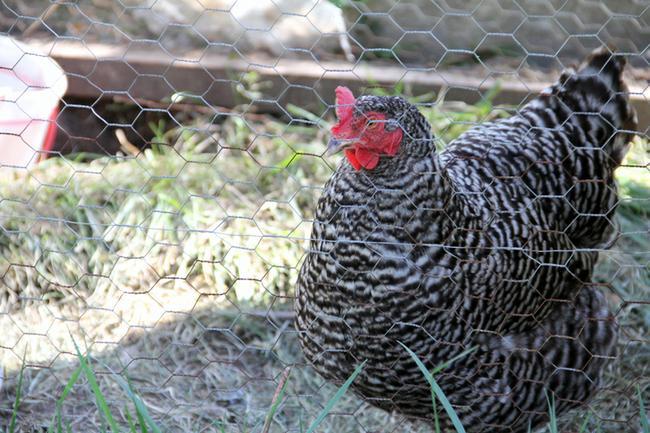
Halfway between Broadway and Paris Road on College Avenue, you’ll find a small, unassuming brick house with a “Sustainahouse” sign in the front lawn.
It isn’t the house itself that’s impressive — it’s what the students inside are doing.
The residents do not use air conditioning or the dryer, but rather keep the windows open and use clotheslines. They compost their food scraps instead of sending them down the garbage disposal. They order grains for dinner in bulk to avoid never-ending packaging. They also own chickens that provide six to eight eggs a week for the residents, and the house is hoping to add more to the pair sometime in the near future.
On Friday, two of the six tenants gave a tour to residents from the Virginia Avenue Complex.
“This is Gretchen and Gertrude,” said AJ Carpio, Sustainahouse resident and Sustain Mizzou spokesman, as he introduced the two chickens to the tour group. “I don’t really know which one is which, so I just refer to them as a pair.”
Sustainahouse, a project of Sustain Mizzou, is part commune, part social experiment and part Sustain Mizzou meeting place. It functions within a 92-year-old house that has not been modified for top-of-the-line sustainable living.
“The house is old,” Sustainahouse resident Kelsey Saragnese said. “The renters are the sustainable part of the Sustainahouse.”
The current residents are the second generation of Sustainahouse residents. They have kept the utility bills from the previous generation in order to compare how they are doing.
“It’s interesting to see how we’re doing,” Saragnese said. “We’re always trying to do better.”
The main concept of the project is to show students it is possible to live sustainably during college, even if the house or apartment itself isn’t built to be a “sustainable” house. Sustainahouse does not have solar panels or geothermal cells, and not every fixture is compatible with compact florescent bulbs. The residents try to show a lot of sustainability involves behavior changes rather than the newest technology, Saragnese said.
“It is easier than you think to change one little habit of living,” said Abigail Keel, Sustain Mizzou president and Sustainahouse resident. “Just doing little things one at a time can have a huge impact in your life, and for the planet. … Be an inspiration to your friends to recycle more at parties, or quit using the dryer.”
The house’s residents have developed a very open nature, Keel said.
“If someone leaves their light on, we simply say, ‘Hey, your light’s on,’ and then we switch it off,” Keel said. “It’s hard to establish every habit on your own, so the help of others is really beneficial.“
Living in the house does not come without its struggles, Keel said.
“The hardest part is probably making decisions about products to buy,” Keel said. “It can be difficult to balance price, convenience and sustainability. Sometimes we buy fruit that isn’t local or organic because it is cheaper or easy to obtain at the moment. It can be hard to make the call on decisions like these because sometimes I don’t know which pillar (of the three above) to value most.”
Sustainahouse is not just for Sustain Mizzou members or soldiers of the green revolution, Saragnese and Carpio said.
“We’re college students, too,” Saragnese said.
“Besides the chickens,” Carpio said.
“Right,” Saragnese said, laughing. “Besides the chickens, we’re like any other college student. We have a little hippie in us, but we’re normal.”